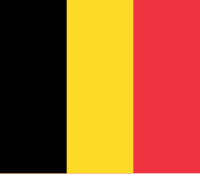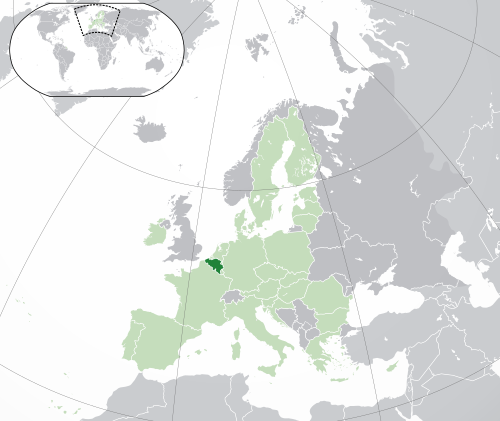 Belgium (pronounced /ˈbɛldʒəm/, BEL-jəm), officially the Kingdom of Belgium, is a state in northwest Europe. It is a founding member of the European Union and hosts the EU’s headquarters, as well as those of several other major international organizations such as NATO. Belgium covers an area of 30,528 square kilometres (11,787 sq mi), and it has a population of about 10.8 million people. Straddling the cultural boundary between Germanic and Latin Europe, Belgium is home to two main linguistic groups, the Dutch-speakers, mostly Flemish, and the French-speakers, mostly Walloons, plus a small group of German-speakers. Belgium’s two largest regions are the Dutch-speaking region of Flanders in the north and the French-speaking southern region of Wallonia. The Brussels-Capital Region, officially bilingual, is a mostly French-speaking enclave within the Flemish Region. A small German-speaking Community exists in eastern Wallonia. Belgium’s linguistic diversity and related political and cultural conflicts are reflected in the political history and a complex system of government.
Belgium (pronounced /ˈbɛldʒəm/, BEL-jəm), officially the Kingdom of Belgium, is a state in northwest Europe. It is a founding member of the European Union and hosts the EU’s headquarters, as well as those of several other major international organizations such as NATO. Belgium covers an area of 30,528 square kilometres (11,787 sq mi), and it has a population of about 10.8 million people. Straddling the cultural boundary between Germanic and Latin Europe, Belgium is home to two main linguistic groups, the Dutch-speakers, mostly Flemish, and the French-speakers, mostly Walloons, plus a small group of German-speakers. Belgium’s two largest regions are the Dutch-speaking region of Flanders in the north and the French-speaking southern region of Wallonia. The Brussels-Capital Region, officially bilingual, is a mostly French-speaking enclave within the Flemish Region. A small German-speaking Community exists in eastern Wallonia. Belgium’s linguistic diversity and related political and cultural conflicts are reflected in the political history and a complex system of government.
The name ‘Belgium’ is derived from Gallia Belgica, a Roman province in the northernmost part of Gaul that was inhabited by the Belgae, a mix of Celtic and Germanic peoples. Historically, Belgium, the Netherlands and Luxembourg were known as the Low Countries, which used to cover a somewhat larger area than the current Benelux group of states. From the end of the Middle Ages until the 17th century, it was a prosperous centre of commerce and culture. From the 16th century until the Belgian revolution in 1830, many battles between European powers were fought in the area of Belgium, causing it to be dubbed the battleground of Europe—a reputation strengthened by both World Wars.
Upon its independence, Belgium eagerly participated in the Industrial Revolution and, during the course of the twentieth century, possessed several colonies in Africa. The second half of the 20th century was marked by the rise of communal conflicts between the Flemings and the Francophones fuelled by cultural differences on the one hand and an asymmetrical economic evolution of Flanders and Wallonia on the other hand. These still-active conflicts have caused far-reaching reforms of the formerly unitary Belgian state into a federal state.
Despite its political and linguistic divisions that have been varied over the centuries, the region corresponding to today’s Belgium has seen the flourishing of major artistic movements that have had tremendous influence on European art and culture.
Nowadays, to a certain extent, cultural life is concentrated within each language Community, and a variety of barriers have made a shared cultural sphere less pronounced. Since the 1970s, there are no bilingual universities in the country except the Royal Military Academy, no common media and no single large cultural or scientific organization in which both main communities are represented. The forces that once held the Belgians together—Roman Catholicism and economic and political opposition to the Dutch—are no longer strong.
Belgium has much fertile and well-watered soil, although agriculture engages only a small percentage of the workforce. The chief crops are wheat, oats, rye, barley, flax, sugar beets, vegetables, fruits, and tobacco. Cattle and pig raising as well as dairying (especially in Flanders) are also important.
Belgium’s economy is reliant on services, transportation, trade, and industry. Coal mining, which has declined in recent years, and the production of steel and chemicals are concentrated in the Sambre and Meuse valleys, in the Borinage around Mons, Charleroi, Namur, and Liège, and in the Campine coal basin. Liège is a major steel center. A well-established metal-products industry manufactures bridges, heavy machinery, industrial and surgical equipment, motor vehicles, rolling stock, machine tools, and munitions. Chemical products include fertilizers, dyes, pharmaceuticals, and plastics; the petrochemical industry is concentrated near the oil refineries of Antwerp.
Notes from Wikipedia and Answers.com









